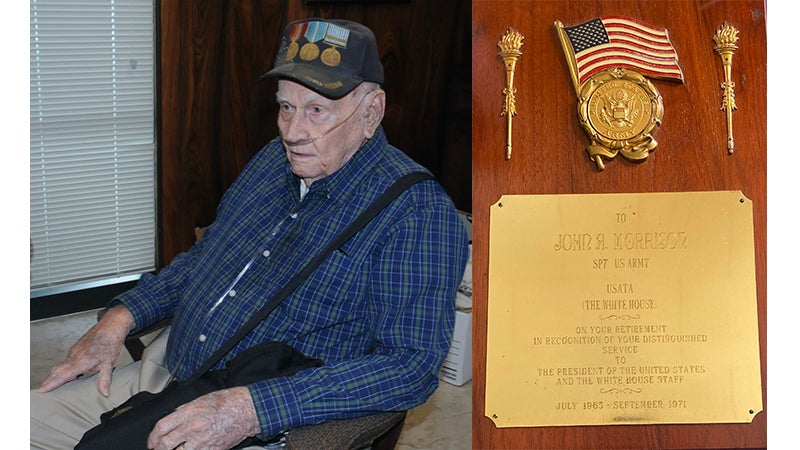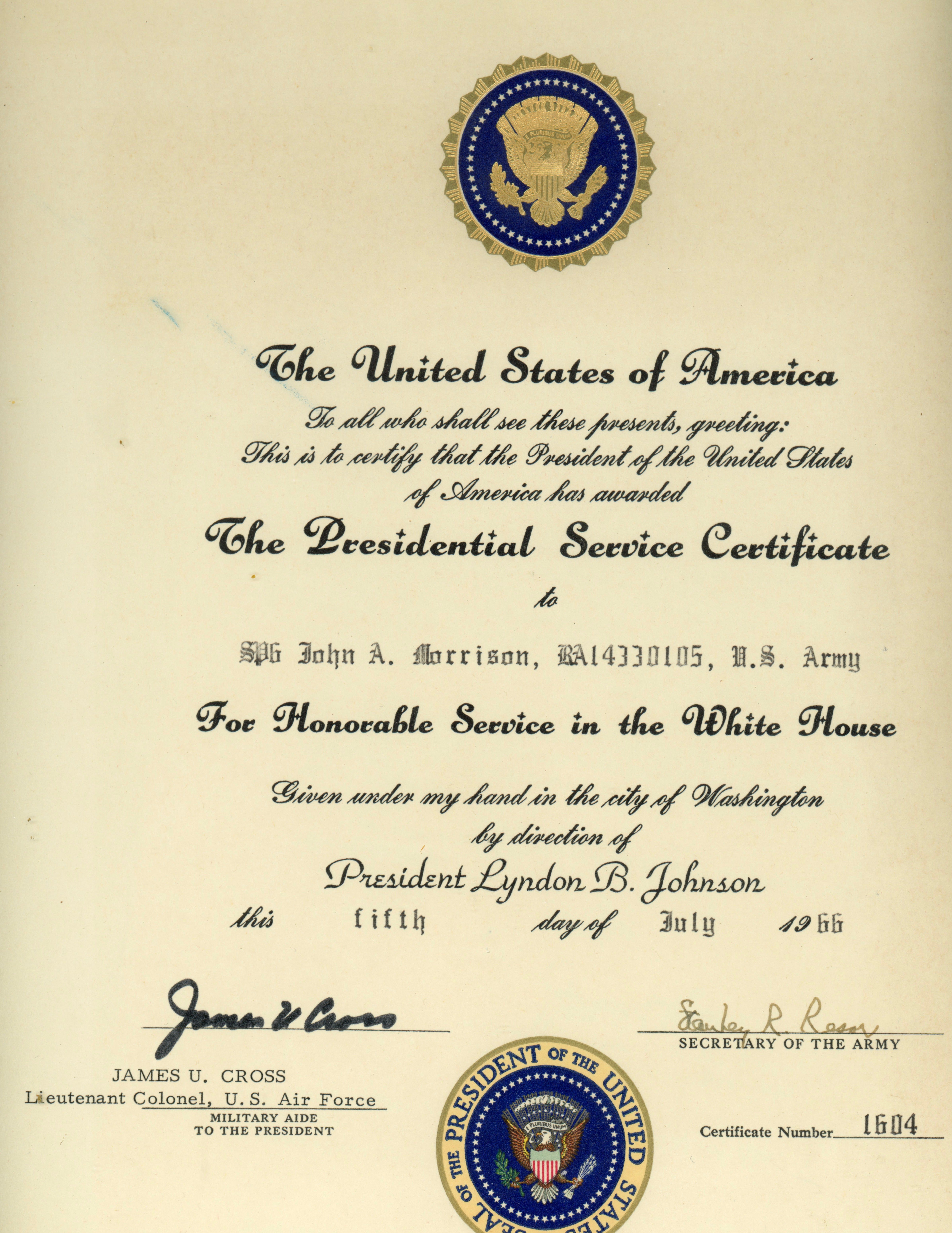John A. Morrison, Sergeant, U.S. Army, Korean War From Korea to the White House Motor Pool – Part 1
Published 1:00 pm Friday, June 23, 2023

- LEFT: John Morrison is a blind 92-year-old Korean War Veteran from Florala, Alabama. He still has remarkable recall of his service in Korea and the other bases [including the White House]where he served during his 22 year career in the Army. [Photo: John Vick] RIGHT: The retirement plaque given to Sgt. John Morrison by the President and White House Staff, September 1971. [Photo: John Vick]
|
Getting your Trinity Audio player ready...
|
John Morrison is a blind, 92-year-old Korean War veteran. He still remembers the cold desolation of the Korean battlefield. He has more pleasant memories of his later years at the White House where he chauffeured two Presidents’ families.

Presidential Service Certificate given to Sgt. John Morrison by President Lyndon B. Johnson, July 1966. Note that it is signed by Col. James U. Cross, Military Aide to the President. Cross was later promoted to General and became the Pilot for Air Force One. James Underwood Cross was a native of the Pleasant Home Community in Covington County, Alabama.
Morrison survived the Korean War, despite being hospitalized several times, twice for malaria, another time with severe frostbite from the minus 30 degree cold and once more when he was severely wounded by a North Korean grenade.
John Angulish Morrison was born July 26, 1930, in Florala, Covington County, Alabama. His parents were Reffie Garrett and John Grider Morrison. John was one of six siblings.
John attended Florala Elementary School, then transferred to Lockhart Junior High School. In the 9th grade, he quit school and went to work for Opp-Micolas Mills in order to help support his family. John had severe sinus problems and was forced to quit the mill after a couple of years. He went to visit an uncle in Lakeland, Florida, hoping to get a job in the citrus industry. Unable to get a job in Lakeland, John enlisted in the Army in September 1949, at the age of 19.
Morrison’s basic training was completed in December 1949, at Fort Jackson, South Carolina. After basic, he was sent to Fort Benning, Georgia, for training in field artillery. On July 2, 1950, Morrison went home on leave and married Vivianne Scheffer. They would have four children.
On July 8, 1950, John Morrison deployed to Korea and was assigned to Company H, 8069th Replacement Battalion at Pusan. After a few weeks, the battalion was marched north to the battle-front near the town of Kunwi [north of the town of Taegu where there had been much fighting]. John wrote home that “his feet were really blistered.” On the march, he carried a .30 caliber, water-cooled machine gun which weighed 38 lbs. when filled with water. In September, he wrote that he had been hospitalized for a week with malaria. He was taken to a hospital and treated for malaria again in January 1951.
During the fighting near Taegu in late November 1950, Morrison suffered severe frostbite of the hands and feet. He was evacuated to a hospital in Osaka, Japan, where he was treated for three and a half weeks and sent back to the 39th Field Artillery Regiment, 25th Infantry Division.
During the fighting near the town of Taegu, Morrison was wounded by a grenade on January 3, 1951. Shrapnel from the grenade struck him in the mouth, knocking out several teeth, in the right knee, right hand, and several places in the head. John still has shrapnel in his head. He was triaged at a MASH [Military Army Surgical Hospital] Unit, then flown to the 141st General Hospital in Tokyo.
John spent several months recuperating and undergoing treatment in Japan. Even though he was not totally healed, he was sent back to the frontlines near Taegu where he fought for another six months. He returned to Pusan around the end of April 1951. John made PFC in Pusan and was assigned to guard duty. He wrote home that he had received “his new teeth.” John and his unit were sent back to the States in July 1951.
After a brief leave, John was assigned to the 3rd Chemical Mortar Battery at Fort Bragg, North Carolina. He spent the next two-and-one half years there before being assigned to the Army’s Dugway Proving Grounds at Dugway, Utah. Dugway was the main chemical weapons testing facility for the Army. John was assigned to the Headquarters Company, 2nd Chemical Battalion as Sergeant of the Motor Pool. He supervised 15 drivers in his company.
John’s company was responsible for transportation of all materials at Dugway. The drivers wore gas masks at all times. Much of the work was and still is classified. However, John often participated in smoke generator drills that tested the effects of gas on mice. He spent 18 months at Dugway before being assigned to Fort Riley, Kansas, as the Transportation Sergeant.
While at Fort Riley, Morrison was sent to Camp Perry, Ohio, for a month, as an instructor at The National Pistol and Rifle Championships. From Fort Riley, he was sent to Camp Eschborn near Frankfurt, Germany, where he served as the Transportation Sergeant, supervising more than 40 German civilian drivers.
After three years at Frankfurt, Morrison was assigned to Redstone Arsenal at Huntsville, Alabama. Morrison was the Transportation Sergeant for the Army at Redstone. In addition to being responsible for the drivers in his unit, John was the chauffer for one of the generals at Redstone. He remained at Redstone for two years.
[End Part 1] John Vick




